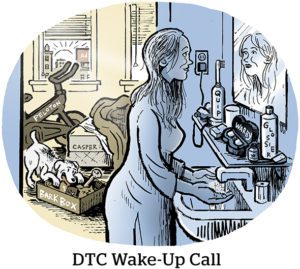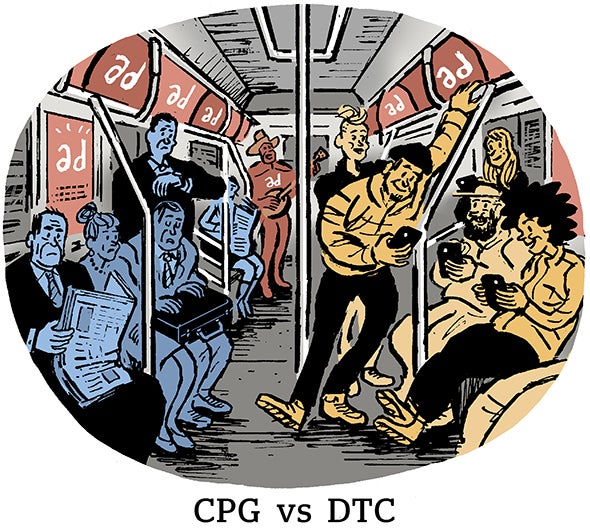It can feel like a big win when a favorite regional or startup brand gets picked up by a national chain like Walmart or Target.
But it’s important to point out that the retailer isn’t making a bet on that brand. The brand is placing a bet that it’ll be able to hack it on a retailer’s shelves – and it might end up losing big.
Getting a distribution deal with Target or Walmart can actually be “catastrophic,” said one startup grocery brand marketer who asked not to be named. This marketer undersold in store and then was saddled with the costs of the product sitting on shelves and in warehouses.
Aside from fronting the cost of the product itself, brands that are new to retail must also push their social or primarily online shoppers to the right stores.
Consider Poppi, a breakout DTC brand with a widespread retail footprint. According to a MediaRadar report published last week, Poppi has outspent Dr Pepper and Gatorade on advertising so far this year.
Poppi spent more than $43 million between January and April – more than five times its entire 2023 ad budget, per MediaRadar, which based its estimate on a sample of social, programmatic, TV, out-of-home, print and radio ads.
To put that into perspective, Poppi’s annual ad spend went from around $1 million in 2022, when MediaRadar began tracking the brand, to roughly $8 million in 2023. It’s now on pace to exceed $150 million or even $200 million this year.
Poppi’s success in retail is tied to its willingness to astronomically increase its marketing spend – and not every brand can. Perhaps, as a prebiotic soda, it can stomach the costs.
The sleeping CPG giants
The costs of retail distribution are further exacerbated by big CPG brands throwing around their weight – and their wallets.
Marketers from two digital-native brands that had multiple SKUs picked up by Target in the past two years told me that, despite exceeding all sales goals, they were stymied by incumbent brands buying out the shelf space with preventatively high slotting fees. (A slotting fee is what brands pay to have a row on a store shelf.)
Startups can still compete against the big guys online.
Coca-Cola, for example, can shell out for an Olympics sponsorship and blanket social media for a few weeks or even outbid all comers for Amazon’s top sponsored unit. But there remain strong organic and paid options to reach fans and potential customers on those online platforms, said one of the aforementioned DTC brand marketers (who also happens to be a direct Coke competitor).
Even Amazon will always show a couple of organic options, she said.
But when two of her product lines were taking off in Target and another large grocery chain, Coca-Cola pulled some strings – or made a large-enough payment – and the DTC brand lost its SKUs, with no recourse. (A SKU is the retail term for any individual product line.)
“When they don’t even bother presenting a number to potentially outbid,” she said, “you know they’ve gone way over your head.”
Private label
Competing against the biggest brands is never easy.
The same DTC beverage brand marketer shared another frustrating anecdote about spending heavily in 2017 and 2018 to associate the company with the term “bubbly,” a common keyword for its online grocery orders.
Then Pepsi launched its zero-sugar soda brand – and called it Bubly. Which means a common misspelling of the word “bubbly” and keyword traffic generated by the startup’s own marketing might slide to Pepsi.
But what’s tougher than other CPGs, she said, is contending with a retailer’s own private-label lines.
Last week, Target published an investor presentation called “Our Food and Beverage Journey.”
In a video accompanying the presentation, Chief Commercial Officer Rick Gomez describes a “three-legged stool” made up of well-known CPG brands, small or niche brands new to many customers and Target’s private-label products.
 Unsurprisingly, the video is a celebration of Target’s private-label brands. For example, although other brands are displayed alongside Target private labels, “shoppers” in the video always pick up the Target item.
Unsurprisingly, the video is a celebration of Target’s private-label brands. For example, although other brands are displayed alongside Target private labels, “shoppers” in the video always pick up the Target item.
But Target shared some useful data, as well.
Target boasts that its food and beverage sales have grown from $16 billion annually to $24 billion in the past five years, after it launched its own food and beverage products and began selling other fresh groceries. Separately, the company said its private-label groceries now generate more than $4 billion annually.
That means Target-owned brands are accruing most of the growth in Target’s total grocery business.
Market Pantry, one of Target’s grocery brands, is the “opening price point” in every category in which it competes, said John Conlin, Target’s SVP of food and beverage merchandising, in the video.
Hearing that reminded me of a joking aside one DTC organic cereal and granola brand marketer made to me. His tin-foil hat theory, he said, was that Target had picked up his product at the exact same time it launched its own much cheaper version.
Why? Primarily to emphasize the price gap between them.











